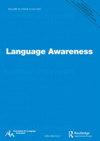Multilingual and multimodal mediation in online intercultural conversations: a translingual perspective
IF 2.2
2区 文学
0 LANGUAGE & LINGUISTICS
引用次数: 6
Abstract
Abstract This study explored peer groups’ mediation processes in the digital space. Building upon translingual research and multimodal discourse analysis, the researcher analysed video transcript excerpts of oral conversations and on-screen interactions among university students of different linguistic and cultural backgrounds. This article focuses on multilingual and multimodal mediation practices, which include polyaccented exemplification, bilingual interpretation, intercultural comparison, transnational definition, polyphonic performance and multimodal instruction (N = 24). The results show that the students attended to dynamic uses of English, Chinese and other languages as multilingual franca while communicating affect and stance through embodied expressions and shared screens in stylised multimodal discourses. The translingual analyses emphasise the students’ collaborative transformations of English as a lingua franca (ELF) communication into playful interactions within digitally mediated networks of relationships. This study suggests that online peer mediation provides useful methods for developing university students’ translingual awareness and capability for participating in intercultural conversations.在线跨文化对话中的多语言和多模态调解:跨语言视角
摘要本研究探讨数字空间中同伴群体的中介过程。在翻译语言研究和多模态话语分析的基础上,研究人员分析了不同语言和文化背景的大学生之间口头对话和屏幕互动的视频文本摘录。本文重点关注多语言和多模态调解实践,包括多口音例证、双语口译、跨文化比较、跨国定义、多声部表演和多模态教学(N = 24)。结果表明,在程式化多模态语篇中,学生通过具身表达和共享屏幕交流情感和立场时,英语、汉语和其他语言作为多语混合语的动态使用。翻译分析强调学生将英语作为通用语言(ELF)交流转化为数字媒介关系网络中有趣的互动。本研究表明,在线同伴调解为培养大学生跨文化对话的翻译意识和能力提供了有益的方法。
本文章由计算机程序翻译,如有差异,请以英文原文为准。
求助全文
约1分钟内获得全文
求助全文
来源期刊

Language Awareness
Multiple-
CiteScore
3.70
自引率
10.00%
发文量
18
期刊介绍:
Language Awareness encourages and disseminates work which explores the following: the role of explicit knowledge about language in the process of language learning; the role that such explicit knowledge about language plays in language teaching and how such knowledge can best be mediated by teachers; the role of explicit knowledge about language in language use: e.g. sensitivity to bias in language, manipulative aspects of language, literary use of language. It is also a goal of Language Awareness to encourage the establishment of bridges between the language sciences and other disciplines within or outside educational contexts.
 求助内容:
求助内容: 应助结果提醒方式:
应助结果提醒方式:


